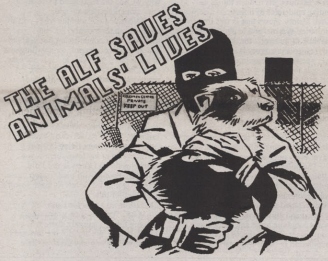If You Can’t Beat ‘Em, Burn ‘Em?
 Animal liberation terrorists are still active in society. Just last month, the Animal Liberation Front claimed responsibility for vandalism that not only occurred at a San Diego fur store, but at the private homes of its owners and their family. This year has also seen acts ranging from a stink bomb attack and attempted torching of a police car to computer hacking and threats of illegal raids. A horse processing plant in New Mexico, originally slated to open this week to much controversy, has suffered an arson attack. And last week there was a “liberation” at a Riverside, Ca., pheasant farm that resulted in animals’ deaths.
Animal liberation terrorists are still active in society. Just last month, the Animal Liberation Front claimed responsibility for vandalism that not only occurred at a San Diego fur store, but at the private homes of its owners and their family. This year has also seen acts ranging from a stink bomb attack and attempted torching of a police car to computer hacking and threats of illegal raids. A horse processing plant in New Mexico, originally slated to open this week to much controversy, has suffered an arson attack. And last week there was a “liberation” at a Riverside, Ca., pheasant farm that resulted in animals’ deaths.
In 2004 the FBI declared animal rights terrorism to be a top domestic threat. In response to this extremism, in 2006 Congress passed the Animal Enterprise Terrorism Act, which upgraded the Animal Enterprise Protection Act of 1992. We’ve learned that the New York City Bar Association is now pushing a resolution at the American Bar Association meeting this week calling on the Justice Department to cease enforcing the law.
The timing couldn’t be worse from a P.R. point of view. The recent event in New Mexico seems to support tough anti-terrorism laws. The Humane Society of the U.S. and other activists tried to use legal channels to stop horse slaughter, and that may not work (it has succeeded in delaying things, though). So some vigilantes decided to do their own (illegal) thing and light a fire.
Interestingly, HSUS itself opposed the Animal Enterprise Terrorism Act in 2006, though HSUS hasn’t commented on the NYC Bar Association’s resolution. But the two groups’ concerns are comparable. Both adopt the premise that the AETA has a chilling effect on free speech.
Some animal rights activists sued over the law on free-speech grounds, but in March a federal judge ruled against them, finding that they couldn’t reasonably prove that the activities they wanted to do would run afoul of the law. After all, the AETA hasn’t stopped PETA from doing street protests. It hasn’t stopped HSUS from attacking businesses. The idea of a “chilling effect” is just silly. That’s because the AETA applies to attempts that involve threats or intimidation or other unlawful activity.
While we’re on the topic of animal rights terrorism, we think HSUS leaves a bit to be desired. HSUS claims to be outspoken about animal-liberation violence, yet, at the “Animal Rights 2013” conference last month at which HSUS employees spoke several times, there were apologists from the North American Animal Liberation Front Press Office handing out their garbage.
Some questions for HSUS: Why are you speaking at events that allow this riffraff, and why aren’t you putting out more press releases condemning illegal acts? After all of the ALF activity this year, we haven’t seen a peep of condemnation from HSUS. HSUS puts out a press release or two every day. It wouldn’t be hard to have a stock “we don’t support illegal acts as a means to stop meat/fur/whatever” release, or to offer a reward for the apprehension of these criminals. (HSUS did this once that we can see, about five years ago.)
Given the pasts of some HSUS employees, maybe there’d be some internal resistance to having such an aggressive campaign. But we can always hope that they’ll move in the right direction.



